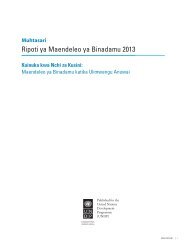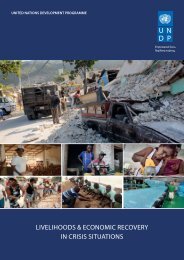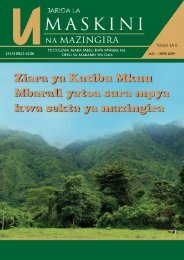Poverty and Human Development Report 2009 - UNDP in Tanzania
Poverty and Human Development Report 2009 - UNDP in Tanzania
Poverty and Human Development Report 2009 - UNDP in Tanzania
Create successful ePaper yourself
Turn your PDF publications into a flip-book with our unique Google optimized e-Paper software.
In recent years, the domestic media has reported serious allegations of corruption, <strong>and</strong> a<br />
number of high-profile cases are be<strong>in</strong>g prosecuted. International sources report an improvement<br />
<strong>in</strong> <strong>Tanzania</strong>’s control of corruption from the late 1990s to the mid-2000s, but also a slight<br />
deterioration s<strong>in</strong>ce 2007. 80<br />
Data from two citizen surveys <strong>in</strong> 2003 <strong>and</strong> 2006 found that a majority of respondents (about 60%<br />
<strong>in</strong> both surveys) perceived that corruption was a serious problem <strong>in</strong> their councils. However, as<br />
shown <strong>in</strong> Table 28, respondents also perceived that the level of corruption had decl<strong>in</strong>ed between<br />
2003 <strong>and</strong> 2006. The percentage of respondents who reported that they or another household<br />
member had ever observed, or been <strong>in</strong>formed about, corrupt acts also decl<strong>in</strong>ed over this period<br />
from 50% to 30%. However, a significant discrepancy was still found <strong>in</strong> 2006 between the<br />
percentage of respondents who were directly aware of corruption (30%) <strong>and</strong> the percentage of<br />
respondents who reported a corrupt act (only 3.5%). This difference can be partly expla<strong>in</strong>ed by<br />
respondents’ lack of knowledge of the right procedures to follow to report a corrupt act, but it is<br />
also likely due to fear of negative repercussions.<br />
Table 28: Citizens’ Views on Corruption, 2003 <strong>and</strong> 2006<br />
Percentage of respondents who agree to the statement 2003 2006<br />
Have you or any household member ever observed/been <strong>in</strong>formed about<br />
an act of corruption by a public official?<br />
Have you or any household member reported any corrupt act by a public<br />
official <strong>in</strong> the last two years?<br />
Do you know the processes to follow <strong>in</strong> report<strong>in</strong>g an act of corruption by<br />
a public official?<br />
50.3 30.3<br />
7.2 3.5<br />
21.7 29.5<br />
I th<strong>in</strong>k corruption is a serious problem <strong>in</strong> this council 59.3 58.0<br />
Corruption is less than 2 years ago 27.3 50.6<br />
Source: Formative Process Research Programme on local government reform, 2003 <strong>and</strong> 2006<br />
(See Fjeldstad, Katera & Ngalewa, 2008a)<br />
Data from the latest round of the Afrobarometer survey (2008) <strong>in</strong>dicates an <strong>in</strong>crease <strong>in</strong> people’s<br />
perception of corruption among local councillors. As shown <strong>in</strong> Table 29, 83% of respondents <strong>in</strong><br />
2008 felt that ‘some’, ‘most’ or ‘all’ of their councillors were <strong>in</strong>volved <strong>in</strong> corruption, compared<br />
with 70% <strong>in</strong> 2005.<br />
80 See Transparency International, <strong>2009</strong>; Kaufman, Kraay & Mastruzzi, <strong>2009</strong>.<br />
CHAPTER 1 - CLUSTER III - GOAL 2<br />
123





